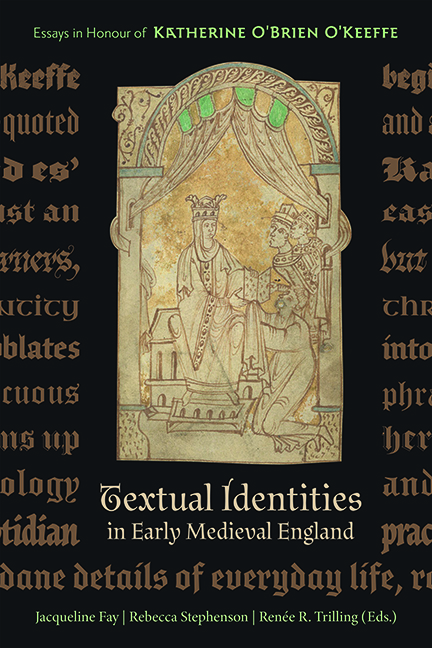Book contents
- Frontmatter
- Contents
- List of Illustrations
- List of Contributors
- Acknowledgments
- List of Abbreviations
- Introduction
- Part One Affect and Embodied Cognition in Medieval Didactic Texts
- Part Two Sovereignty, Power, and English Textual Identities
- Part Three Acts of Public Record in Making and Sustaining Communities
- Overview Of Career
- The Writings of Katherine O’Brien O’Keeffe
- Bibliography
- Index of Manuscripts
- General Index
- Tabula Gratulatoria
- Anglo-Saxon Studies
7 - The Bodies Politic: Conflict, Consent, and English Identity During Godwin's Exile
Published online by Cambridge University Press: 26 May 2022
- Frontmatter
- Contents
- List of Illustrations
- List of Contributors
- Acknowledgments
- List of Abbreviations
- Introduction
- Part One Affect and Embodied Cognition in Medieval Didactic Texts
- Part Two Sovereignty, Power, and English Textual Identities
- Part Three Acts of Public Record in Making and Sustaining Communities
- Overview Of Career
- The Writings of Katherine O’Brien O’Keeffe
- Bibliography
- Index of Manuscripts
- General Index
- Tabula Gratulatoria
- Anglo-Saxon Studies
Summary
THE 1051 exile of Earl Godwin threw King Edward and his nobility into an especially acute, if not altogether unusual, political crisis. Godwin had come to power during the Danish conqueror Cnut's reign, and he was by many accounts the second-most powerful person in England at the time of his exile. In March of that year, Edward had chosen the Norman Robert of Jumièges to be archbishop of Canterbury over Godwin's kinsman Ælric. Soon after his elevation, Robert took Godwin to court, alleging that he had infringed upon church lands. As the conflict intensified, Robert formally accused him of having murdered Edward's brother Alfred fifteen years before. Although some of Edward's witan [council] intervened on Godwin's behalf, Edward refused to hold normal legal proceedings that might establish Godwin's guilt or innocence and instead banned the earl from England. Godwin returned to the kingdom a year later in spite of military opposition. He performed a ritual submission to Edward, and the crisis passed as suddenly as it had begun. Godwin's exile stages with unusual clarity and detail the nature and limits of royal power during Edward's reign. As I argue in this article, his exile both illuminates the discordant coalition politics behind Edward's royal power and reveals how these politics constantly negotiated the question of what it meant to be English in the decades before the Conquest.
While much important work has shown how the politics of early English kingship were built around counsel and consent, this article contends that they were at the same time inherently conflictual. Consent and conflict were a tension intrinsic to royal and conciliar politics. Traditional studies of medieval kingship explain the nature and development of the office, often taking an approach broadly rooted in intellectual history. Current work, on the other hand, emphasizes kingship as a political practice, one effected principally through royal assemblies. According to Timothy Reuter, ‘it was mainly at assemblies that early and high medieval polities were able to act and indeed to exist.’ The English kings, who had always been peripatetic, held assemblies at strategic locations that facilitated communication among the kingdom's leading administrators.
- Type
- Chapter
- Information
- Textual Identities in Early Medieval EnglandEssays in Honour of Katherine O'Brien O'Keeffe, pp. 150 - 169Publisher: Boydell & BrewerPrint publication year: 2022

